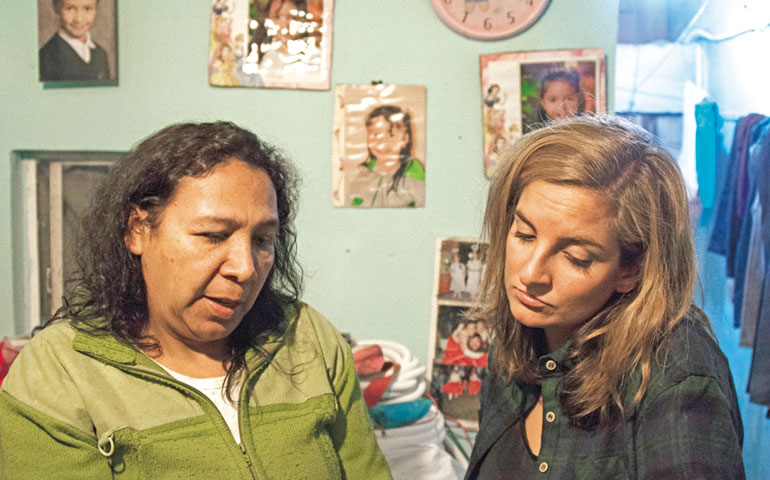
Juana Cabral, left, and Soli Salgado Sept. 5 in Buenos Aries, Argentina (Moracio “Tati” di Renzi)
Who were the families that formed Archbishop Jorge Bergoglio's understanding of family life in Argentina? What did these families tell the future pope? What did he learn from them? Those were the research questions with which we dispatched Soli Salgado, NCR Bertelsen intern, to Buenos Aires.
One of Francis' earliest decisions as pope was to hold a Synod of Bishops on family issues. That seed of an idea grew into two synod sessions, extraordinary in 2014 and an ordinary synod this October. It was fertilized by the ideas of hundreds of thousands of Catholics offering input through official and unofficial channels in dioceses across every geographic region of the world.
The idea -- the promise of being asked their opinion, however flawed the processes used -- ignited the imagination of Catholics around the world like no other papal announcement in years, perhaps decades.
We don't know what fruit the synods will bear, but Catholics have taken the discussions to heart. If you've been reading NCR over the last 18 months, you know this already. We've chronicled many of those stories in the lead-up to the dual synods.
But the questions that nagged at us surround Bergoglio: How does he understand family? And who taught him those lessons? Could we find them?
Was it luck or providence that brought Soli Salgado to NCR, this tiny paper in Kansas City, Mo.? Salgado was raised in Kansas but her family originates in Buenos Aires. She's fluent in Spanish herself. We realized she was the reporter we needed for this job.
Salgado did go to Buenos Aires and she did bring back that story. I hope you find it as compelling as I did. I think -- but you be the judge -- it also gives us some more insight into the Francis pontificate.
- Part One: Buenos Aires slums have shaped a papacy
- Part Two: Francis' participation with families an example for other priests
- Part Three: Change in Argentinean church comes from bottom up
~ ~ ~
By the time you read this Editor's Note, you will most likely have seen the Francis pontificate much more closely than you have since his election two and half years ago. As we go to press, Francis hadn't even left Rome. By the time you're seeing this, he will likely already be in the United States.
This is the print journalist's conundrum. As a colleague here said as we planned for this issue, "How do I report in the future on something that is already over when it hasn't happened yet?" It's not quite that confusing, but I'm sure you readers understand.
Even now, however, Catholics in the U.S. are excited with anticipation -- even though we're not too sure what to expect. Francis won't be pinned down. He's too conservative for liberals and too liberal for conservatives, which is to say, to quote from our editorial of July 31-Aug. 13, he makes us squirm. "In the United States, the [pope's] eloquence is difficult to discern. The words make us squirm. ... This pope is not ideological or partisan. He is radical in the most essential sense -- going to the root of things."
He is not changing doctrine (though he did just rewrite a significant section of canon law on annulments), but he is undeniably calling us to look at the world afresh. He is calling us to cast aside our prejudgments and be open to new things.
Our hope, and maybe Salgado's story from Buenos Aires reinforces this, is that Francis and other church leaders will be as open to us -- on the issues of sexuality and women's ordination, as two examples -- and that they will hear us, listen to our experiences and see old questions with fresh eyes.
That's the hope.